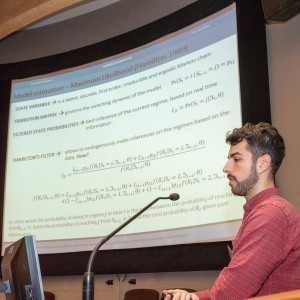Chapters
In a world where technology is second nature to most teenagers, some parents and pupils are beginning to question the relevance of ICT - Information and Communications Technology.
These digital natives - people who have never known a world without instant communication and digital tools accept technology as an integral part of life. That sets up a paradox. Let's explore that, shall we?
Air is all around us; indeed, it is vital to our continued existence in a way that digital technology could never be. So, is learning about air useful?
You might think: "Learning about air? Why would anyone, unless there was some way to revolutionise it, expand on it and make it more profitable/useful!" Therein lies the rub: air is a widely-available yet finite commodity; something we all need to live but, to one degree or another, take its availability for granted.
Not so ICT. There is money to be made in expanding our means of communication; in selling devices that allow even citizens of the poorest nations to access global communication. The field is infinite and, as yet, mostly unexplored. For all intents and purposes, cyberspace has no boundaries and we are still coming up with ways to conquer every inch of it.
So, Is learning ICT useful? That's what your Superprof discusses today.

What Is ICT?
Imagine living in medieval times. Maybe you're Joan of Arc's bestie or perhaps you were mates with the legendary Robin Hood when, all of a sudden, you are catapulted forward in time. One moment, you're breathing in smoke from your hut's wood fire and the next, car exhaust assails your nostrils.
What would you make of our world?

We tend to think of technology as purely digital but books represent technological advances, too. Even the wheel, invented some 6000 years ago was a technological advance but printed, bound pages (books) represent the closest analogy to digital technology.
- Books are storage devices: they encapsulate a slice of culture and knowledge representation of the time they were compiled.
- Books are communications devices: they broadcast ideas from a single author into the wider world
- Books are portable even though some, like War and Peace, are more awkward to lug around.
- Books are shareable: this feature drives the concept of libraries
- Books are graphic: some may contain illustrations while others paint vivid pictures with only words
- Books entertain, educate and spur imagination and creativity.
From their earliest days, books have inspired awe and fear - a vague unease that the world was changing too fast to keep up with. Today's information technology has the same effect.
While we marvel at our connectivity, we worry about the loss of privacy and undefined threats that may yet impact our personal and national security. While our digital assistants compile our shopping lists, give us directions and plan our day, we silently mourn the loss of our autonomy and spontaneity.
Still, information and communications technology developments continue.
In its early days, ICT referred to the melding of computer and telephone networks through a single linking system. Radio, television and satellites were not necessarily considered branches of the same tree but, as the concept of ICT stretches to include every aspect of communication, they - alongside networking hardware, computers and cellphones, are now identified as a part of the Communications tree.
Unfortunately, analogue as they are, books have fallen by the wayside.
Read more in-depth about IT course definition...
The Pitfalls of Learning ICT
Information and communications technology is, in itself, not new; rather, it is a blending of old concepts and new science.
Many university students studying ICT find themselves being taught things about information and communication systems that they’ve either known for years or can pick up within fifteen minutes, meaning that some can become bored and disillusioned with the subject.
Indeed, so much in this field is common sense: this router can serve on that network and you must have this powerful a server to drive that dynamic a system...
Even more pertinent to teaching Information Technology in universities: these courses include a lot of statistical analysis and probability calculation. There is also a maths component but it is not as strenuous as most might think. Still, if a student is not adept at critical thinking, s/he might find such courses difficult.
One major problem plaguing ICT courses the world over is the dearth of female students. This trouble isn't just in studying technology systems but throughout STEM (Science, Technology, Engineering and Maths) courses in general.
Female students are sometimes discouraged from taking these classes in school because those fields are traditionally staffed by males while others fear (feel?) the inherent, well-publicised discrimination. And, of course, there exists a grievous wage imbalance; females statistically earn far less than their male counterparts in any tech-based career field.
Finally, the biggest problem of all: advances and new developments happen so fast that, by the time one finishes a semester at university, what they learned is likely already outdated.
The Case for Studying ICT
The fact that we live in a world driven by digital innovation makes it more crucial that all students have the skills they need to keep up with these rapidly developing technologies. We also need a steady supply of professionals who can continue to discover, design and invent new equipment, instruments and programming - to say nothing of improving on what's already here and functioning.
Besides those obvious, practical reasons for learning, ICT teaches some of the most transferable skills that will be useful if not crucial to a number of jobs. Those skills include critical thinking, problem-solving, theorising, visualising and communicating. There are also physical benefits: the sharpening of fine motor skills and the ability to work with precision and patience.
So, why exactly is ICT so useful? Let’s take a look at some specific reasons.

From a Gamer's Perspective
For many gamers, the data and design that drives their avatar through its various feats is a fait accompli - it just happens; there's no need to think about it. ICT allows students to understand how and why characters in these digital worlds move, act and level up the way they do.
Gaining an understanding of programming and game development can help players' ability to learn new software quickly and efficiently. This is an extremely useful and desirable skill which will make young people more adaptable and versatile students when it comes to absorbing knowledge of every other discipline.
How Knowledge of Information Technology impacts Education
It helps students work well in many other subjects.
ICT draws on knowledge from a variety of other subjects from Mathematics to Science to Art. For instance, those aforementioned gamers unwittingly expose themselves to graphic art and algorithms, all cleverly driven by tiny, silicon-shrouded components.
Understanding how software, hardware and programming work to create a functional digital tool opens up a world of possibility for future IT professionals. Being able to navigate computers and programs confidently will be useful to pupils in nearly any subject they decide to pursue, be it directly related to computer science or as an end-user.
They will be able to concentrate on the task in question, without struggling with the application they are expected to use. They may even write a few programmes to make their jobs easier!
Are you an adult learner wondering if there are any careers in IT and computing for you?
How Technology Education Advances Social and Personal Development
ICT is an amazing resource for tackling underachievement and self-doubt.
When I was younger my parents made me play a maths space game to help me memorise multiplication tables. It wasn’t my favourite thing to do but, looking back, it was a lot more engaging than maths lessons - in school or with a tutor, and I remember my timetables to this day.
Interacting with the world from behind a computer offers one a sense of anonymity; a protective cloak from under which one may express any sentiment, to any degree of verve one might wish to.
Besides social media, startling proof of that assertion comes from a most unlikely source: Studies show that ICT has been used effectively to tackle boys’ underachievement in writing and poetry classes.
Unfortunately, we still live in a world where phrases like 'Man up!' and 'You cry like a girl!' are used to demean and denigrate. The hit film Billy Elliot is yet another testament to how people might be ridiculed for following their passion, wherever it may lead them.
Safely behind a computer screen, young boys need not fear being called sissies and girls are absolved of the mandate to embrace strictly feminine pursuits.
You might say that information systems are great levellers: everyone has equal access when operating one... provided they know how to use it.
Isn't that an excellent reason to pursue an education in IT systems? If so, what do you think about computing courses with tutors?
Fostering Safety on the Web
ICT study teaches young people how to be safe in cyberspace.
At first, it was just a matter of mild bullying - frenemies might flood your MySpace with a host of negative comments. Soon, though, cyber-bullying became a real and dangerous phenomenon, followed by cyber-stalking, and demanding compromising pictures in return for silence about... something dire.
The smarter our devices have gotten, the more danger they expose us to.
Now, there's ghosting and doxxing and hacking and identity theft. The more of our lives we live online, the more we leave ourselves open to unsavoury and downright dangerous behaviours. Kids have to know about them and learn what to watch for so they can stay safe.
With so many online communities children and teenagers can access, it is vital that they be informed about the risks associated with having an online presence.
ICT teaches them how to be sensible, safe and responsible when accessing the internet, surfing the web and interacting in cyberspace.
Also find out all you need to know about programming courses...

Going Beyond Information and Communications Learning
Working in ICT involves a lot of independent thinking and problem-solving.
Students will encounter many problems within their ICT work and, the longer they study it and continue to solve more issues, the better they will get at it.
Problem-solving is a transferable skill which will keep today's school students - who are seldom encouraged to develop their thinking capabilities, from being daunted by technical problems.
Through ICT courses, pupils are provided with a safe environment to make their own errors and to learn how to overcome them. That's another social and developmental skill that is often overlooked in public education.
A variety of job opportunities rely on a candidate’s ICT abilities. These include everything from business administration to teaching and even government work.
Remember that vicious WannaCry virus that attacked our NHS computers a few years ago? Even more ominous: just this year, more than 20 malicious threats are circling around in cyberspace, just waiting for the right, unsecured terminal to wreak havoc.
To set students up with the best chance at a stable, lucrative, in-demand career, schools must teach ICT and devote more resources to teaching related disciplines like maths, science and engineering... but maybe even that's not going far enough. After all, courses in Maths and Science already exist; perhaps we should promote them as more engaging - not boring and stuffy, as they are often perceived to be.
In a world where most teenagers understand computers as extensions of themselves, it is crucial that all schools make a conscious effort to teach their pupils how to build computers, write basic programs maximise search engine capability.
So, while many students may find themselves learning ICT skills they have already picked up on; kids who think that GCSE ICT is too basic for them, such a curriculum guarantees that students have sound knowledge of how computers and related technologies work.
Considering that the digital world - unlike the realm where books were the highpoint of technology, it is crucial that all young people are given an equal opportunity to know how to use the technology they will rely on it when they start their business or professional career.
Your turn to chime in: do you have any questions on IT training courses?
















